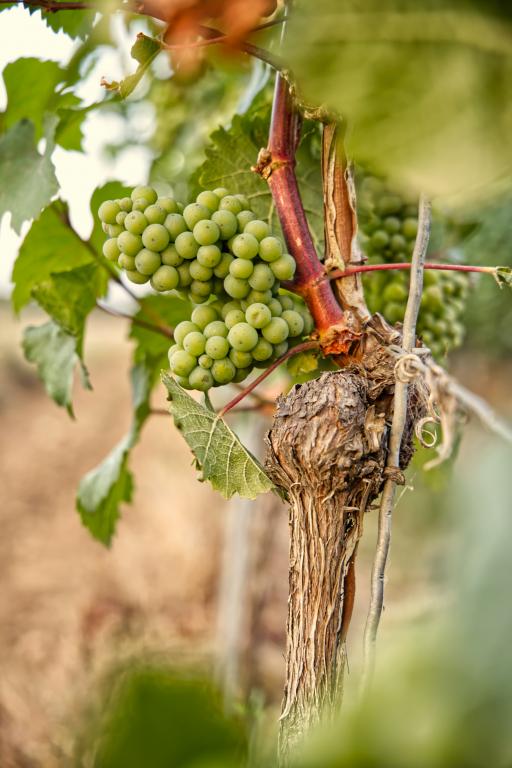Jesus said, “The kingdom of heaven is like a landowner who went out early in the morning to hire laborers for his vineyard. After agreeing with the laborers for the usual daily wage, he sent them into his vineyard. When he went out about nine o’clock, he saw others standing idle in the marketplace; and he said to them, ‘You also go into the vineyard, and I will pay you whatever is right.’ So they went. When he went out again about noon and about three o’clock, he did the same. And about five o’clock he went out and found others standing around; and he said to them, ‘Why are you standing here idle all day?’ They said to him, ‘Because no one has hired us.’ He said to them, ‘You also go into the vineyard.’ When evening came, the owner of the vineyard said to his manager, ‘Call the laborers and give them their pay, beginning with the last and then going to the first.’ When those hired about five o’clock came, each of them received the usual daily wage. Now when the first came, they thought they would receive more; but each of them also received the usual daily wage. And when they received it, they grumbled against the landowner, saying, ‘These last worked only one hour, and you have made them equal to us who have borne the burden of the day and the scorching heat.’ But he replied to one of them, ‘Friend, I am doing you no wrong; did you not agree with me for the usual daily wage? Take what belongs to you and go; I choose to give to this last the same as I give to you. Am I not allowed to do what I choose with what belongs to me? Or are you envious because I am generous?’ So the last will be first, and the first will be last.” Matthew 20:1-16
I knew a woman some years ago who was suffering from a terminal illness. Her husband was praying for her to recover, and she repeatedly urged him to stop. But, at the same time, she expressed a real fear of dying.
On the surface of it all, I wondered whether she was unwilling to confront death itself. We all are, to one degree or another.
But as we talked, it became clear that what she really feared was that God would not or could not forgive her. She was convinced that she was dying because of choices that she had made along the way. She viewed her impending death as punishment. And – on the other side of it all – she was certain that God would not forgive her.
It is hard to convince someone who believes that there is no future that there is, in fact, a future filled with all of those things that we need most. That was the kind of loneliness that she was suffering – the desperate place where she lived.
But the challenge spiritually was that she was trapped in a single way of thinking about God and the way that she thought about God did not allow her to hope. It was too late. Time had run out. The opportunity had passed her by.
The parable of the generous vineyard owner stakes out a very different set of understandings about God and about the Kingdom of God. The owner of the vineyard goes out not just once, but over and over again, even when the day is almost over, to find new people to work in his vineyard.
The image of the vineyard would have made immediate sense to Jesus’s audience and to the readers of Matthew’s Gospel, most of whom were Jews. The vineyard was already an ancient image used to describe Israel. In both Isaiah 5 and Psalm 80 Israel as God’s vineyard is the object of God’s love and provision – a place of refuge, a place where healing and safety reigned. The allusion to the Garden of Eden would not have been lost on Jesus’s hearers.
The vineyard was also a place where Israel’s own faithlessness had been revealed. The vines had produced nothing but bad fruit and that faithlessness had exposed Israel to destruction. So, although the point of comparison shifts from vines to laborers, the vineyard was also a place where the choice to accept the owner’s invitation was thread-through with spiritual and moral significance.
The element of Jesus’s story that stands out the most is the owner’s behavior. Like my friend, some of those around Jesus believed that the offer had been made, refused and forever lost. If you had not said “yes” the first time, the opportunity was lost. Some looked back on Israel’s history of exile and the dominance of their Roman overlords and no doubt thought that was the case.
Others believed that the offer of forgiveness, grace and mercy could never be made to them. They had too much on their record or they came from the wrong place. Gentiles, women, tax collectors and those who were unclean by Jewish standards clearly thought that was the case.
Still others believed that they had earned a privilege that others didn’t deserve because they were the first ones to accept the offer. Even the disciples had this problem and it is reflected in their questions about what they were going to get out of being the first to believe and follow Jesus.
But here was a vineyard owner who showed up offering refuge, over and over again. And, as Jesus makes clear in his parable, that refuge is not conditioned or diminished by the number of times it is offered or the time when it is accepted. Those who arrive late are paid the same as those who have arrived early and those who arrive late are paid first to make the point. No one receives less than what is promised, and everyone receives more than they deserve.
It is a picture of abundance. It is a picture of unexpected generosity. It is a picture of tenacious love.
But there is still one more unexpected feature of the parable that would have stood out to Jesus’s audience. When those who have worked the entire day protest that this is all unfair, the vineyard owner asserts his prerogative to be just this generous. “Am I not allowed to do what I choose with what belongs to me?”
In those words, the audience would have heard the voice of divine sovereignty. The insistence that there is a God and that we are not.
As I listened to my friend, I realized that she did not just need to know that it was not too late or that the same abundant love and mercy could be hers. She needed to know that the gift of love and mercy was given by one sovereign enough to make that offer without it being eroded and diminished.
And not just eroded and diminished by others. In fact, those closest to her wanted everything for her. She needed to be sure that the assurance of forgiveness and grace could not be taken from her by the voices inside her own head. The voices that whispered she wasn’t good enough, that there was something so ugly, so repulsive, that God could not wrap his arms around her. The voices whispering that hadn’t wanted this long enough. That – believe what she might – that kind of healing could not be hers.
In the challenge offered by the owner of the vineyard Jesus describes just that kind of sovereignty. A sovereignty that belongs to God alone. A sovereignty that cannot be challenged. An offer of love that cannot be revoked by the challenge of others or the doubts of our own hearts.
Friends, I cannot know what you may be struggling with in your own spiritual life. How much guilt or regret may weigh on you. What things may haunt you from your past. What kind of doubts may keep you from accepting God’s forgiveness and love. But the gift of love is yours, now, and it is not too late.
Friends, I cannot know what you may be struggling with in your own spiritual life. We are often as much a mystery to ourselves as we are to one another. So, it would be ridiculous for me to make that claim.
I cannot know how much guilt or regret may weigh on you. I cannot know if there are things that haunt you from your past. I cannot know what kind of doubts may keep you from accepting God’s forgiveness and love.
But what I do know – from experience and from the promise of Jesus’ parable – is that the gift of love, forgiveness, healing and joy is yours. It is yours now. And it is not too late.
Photo by Moritz Knöringer on Unsplash












